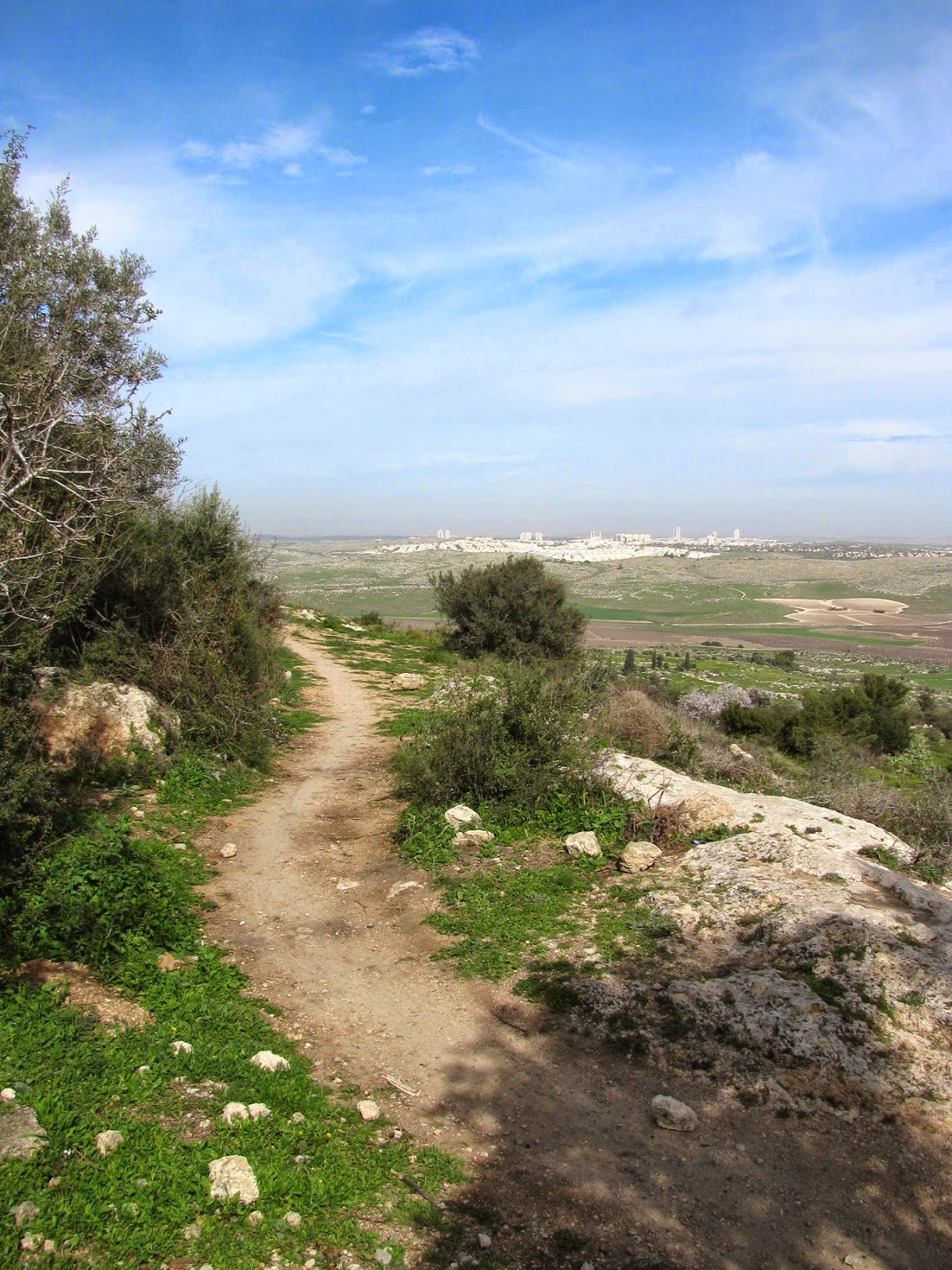The Ayalon Canada Park, located between Tel Aviv and Jerusalem, covers an area of 7,000 dunams and is filled with wooded areas, walking trails, water features and archaeological sites. Trees in the park include olive, carob, pomegranate, pine and the aforementioned almond. The area is also home to a range of wildlife from lizards and turtles, to grey ravens and blue jays. Historical ruins on the grounds of the park include burial caves, an aqueduct, agricultural installations, a Roman bathhouse, a Hasmonean cemetery, and a Crusader fortress. Two Second Temple-era ritual baths were also discovered there.
The Ayalon Canada Park is a favourite destination for off-road bikers, hikers and picnickers who enjoy the scenery and the weather, but few know the story of the former Arab villages on whose land the park now sits. Until 1967 the Arabs were able to endanger the old Tel Aviv – Jerusalem highway by taking advantage of the hills around the Ayalon Canada Park and their commanding view of the valley. The mobilisation of Egyptian forces along the Israeli border in the Sinai Peninsula was the start of the Six Day War, and the Israeli Army captured the region in which the Ayalon Canada Park is located on the second day of the war. Israel annexed the land as part of strategic plans to widen the Jerusalem corridor. Four Arab villages were razed and the Ayalon Canada Park was established on the lands of two of the villages, Imwas and Yalo. The villagers were offered compensation but were not allowed to return.
My tour of the park with the Eretz HaHashmonaim Centre for Study and Tours gave me the opportunity to see things that I have never noticed before, even though we have picnicked in the park many times over the years. We drove through the park, stopping several times to see historical ruins and to hear about the various battles that took place in the area. Joshua fought there against the Canaanite king. There were also fierce battles in the Ayalon Valley between the Hasmoneans and the Seleucids in the 2nd century BCE. In the first stage of the Arab occupation of the land of Israel in the 7th century CE, this valley served as a centre for their forces. Many fierce battles also took place here, between the Israel Defence Forces and the Jordanian Arab Legion, during the War of Independence. We learnt that Ariel Sharon, Israel's 11th Prime Minister, was shot in the area, in the First Battle of Latrun. His brigade suffered 139 deaths. Sharon survived because he was helped by a 16 year-old soldier under his command who virtually carried him through the field, surrounded by Arabs, relying only on Sharon’s flawless sense of direction to guide them to safety. From then on, it was declared that an Israeli soldier would never be left in the field, no matter how badly injured.
Battles aside, we stopped to see an ancient wine press carved in the rock, where grapes were pressed to make the grape juice that was fermented into wine, and enjoyed the stunning panoramic views from Derech HaTamar (Tamar Trail) at the eastern edge of the park. Shvil HaMa'ayanot (the Valley of the Springs) was our next stop. The valley is around 1.5 kilometres long, and alongside it are interesting remains from the water system of the Roman city of Emmaus-Nicopolis. The aqueducts in the valley were built in the Late Roman period (3rd and 4th centuries CE). Along the trail were what seemed like thousands of blossoming almond trees, as well as fig and pomegranate trees, all surrounded by beautiful terraces built for farming. Especially notable along the trail was the Roman Tomb, a grave site of a family that lived here 1,800 years ago, carved in the rock (bottom photo).The Ayalon Canada Park is a favourite destination for off-road bikers, hikers and picnickers who enjoy the scenery and the weather, but few know the story of the former Arab villages on whose land the park now sits. Until 1967 the Arabs were able to endanger the old Tel Aviv – Jerusalem highway by taking advantage of the hills around the Ayalon Canada Park and their commanding view of the valley. The mobilisation of Egyptian forces along the Israeli border in the Sinai Peninsula was the start of the Six Day War, and the Israeli Army captured the region in which the Ayalon Canada Park is located on the second day of the war. Israel annexed the land as part of strategic plans to widen the Jerusalem corridor. Four Arab villages were razed and the Ayalon Canada Park was established on the lands of two of the villages, Imwas and Yalo. The villagers were offered compensation but were not allowed to return.
Thanks to the generous support of Canadian friends of KKL-JNF (Jewish National Fund), the Ayalon Canada Park was completed in 1984. JNF Canada continues to fund the upkeep of the park through donations received for this purpose. In the middle of the park is a forest planted to commemorate over 300 American and Canadian Jews who died in Israel's wars or were victims of terror.







































3 comments:
a beautiful park! love the blossoms. such recent history of battles and losses. it is heartbreaking.
Stunning landscape. I was see why it a draw for picnics. The old wine making site would intrigue me.
Thanks for sharing, nice post! Post really provice useful information!
Giaonhan247 chuyên dịch vụ mua hàng mỹ từ dịch vụ order hàng mỹ hay nhận mua nước hoa pháp từ website nổi tiếng hàng đầu nước Mỹ mua hàng ebay ship về VN uy tín, giá rẻ.
Post a Comment